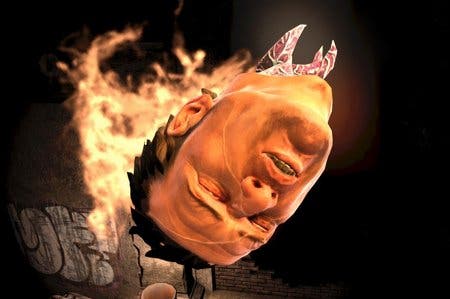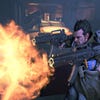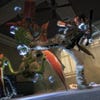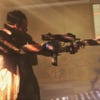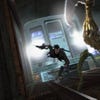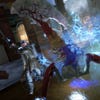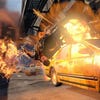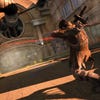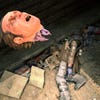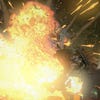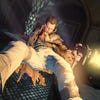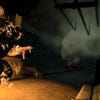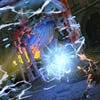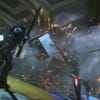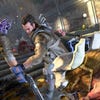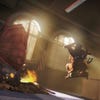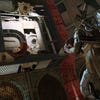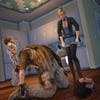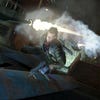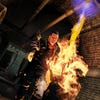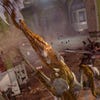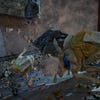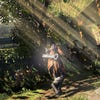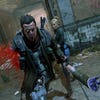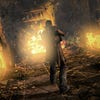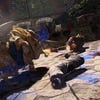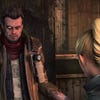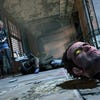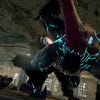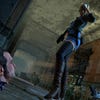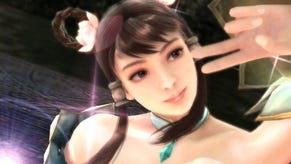NeverDead Review
Mostly armless.
"Yeah, so I heard that in NeverDead, you can rip your own head off and use it to roll through ventilation shafts. I heard you can attach your head to your severed limbs and just wobble around on the floor kneecapping demons with your twin pistols. I heard you can pluck your right arm off and then throw it, still clutching an Uzi, into the mouth of a giant boss, so that he'll swallow it and you can then shoot him from the inside and the outside at the same time."
Princess, you heard right. You can do all of that stuff in NeverDead, because NeverDead is kind of amazing. And it's lucky that NeverDead is kind of amazing, because - quite a lot of the time, at least - NeverDead also isn't actually very good.
Konami's latest is the fruit of a weird collaboration between Metal Gear Acid director and long-time MGS stalwart Shinta Nojiri and Rebellion, a venerable studio based right here in plucky old England. Together, they've come up with a game about Bryce Boltzmann, a grouchy Tom Waits-alike who wanders the streets of New York hunting demons with a sexy lady named Arcadia.
Bryce is cursed with immortality - which, you'd think, must be about as terrible as being cursed with really nice ankles. But while he can't be killed, he can still be chopped into pieces. Whenever this happens, he'll then trundle about, using his scattered body parts with creativity and violent flair until a brisk combat roll sticks him back together again, or a meter fills up and he can generate an entirely new body from scratch.
Your enjoyment of all this hinges on how amusing you find a man saying, "I need a hand! Literally!" once every five minutes as he hops around a sewer level with his hair on fire. Don't get me wrong: NeverDead has an enviably bizarre direct-to-video personality, and its opening half-hour is loaded with more WTF moments than you can normally hope to expect from an action game in 2012. It thrills me that a game with this premise exists, and the whole thing feels earnest in its nuttiness rather than crazy for the sake of it. It's a genuine meeting of East and West.
The price Konami has had to pay for this delightfully unusual concept, however, is a lingering sense of cheapness. It's clearly a risky proposition, and I'm not certain it's been backed with enough investment to pull it off properly. The environments are barren, the sound is glitchy during cut-scenes and the camera is awkward to shunt around. Worst of all, NeverDead gets repetitive really quickly.
The combat can probably take most of the blame for this. With little in the way of set-pieces or palate-cleansers, NeverDead's first few hours tend to dump you into a series of muddled interiors before barring the exits after you move through each doorway, trapping you in rooms filled with monsters. In order to proceed, you have to take out a selection of demon spawn points while they burp a tasting menu of otherworldly horrors into your face. Once they're destroyed, the exits open up again, you advance, and the whole thing repeats itself.
Occasionally there's a very simple puzzle to tackle in between bursts of violence, but it doesn't save you from the relentless application of an uninspiring formula - and NeverDead's moment-to-moment demon slaughtering isn't quite entertaining enough to cope with such a bare-bones approach to design.
Bryce can attack enemies with dual-wielded guns, but most of his arsenal is pretty characterless, conveying no sense of power or kickback whenever you pull the trigger. He can also slice baddies up with a sword, which you wield with quick flicks of the right stick. This control scheme is actually fairly entertaining, but lunges and strikes tend to be imprecise and the hit-responses you're getting from your victims are stilted and unreliable, meaning you don't always know whether your blows are connecting properly.
Enemies, meanwhile, may be wonderfully strange in their designs - there's everything from pig-like foot-soldiers through to spindly giraffe-things with blades for heads and some vulture-ish harpies who have laser sights attached to their faces - but they're all pretty tedious to hack away at. What's more, they're flung at you so ceaselessly (and often in such close quarters) that you never have time to ponder how you might like to approach the next encounter, let alone think about planning anything fancy with your disembodied arms and legs. For the first few hours, in other words, NeverDead is too busy juggling unconvincing shooting and slashing that it forgets to focus on the one thing that could have made it truly brilliant.
Weightless guns and clunky swordplay - and the annoying pause as you switch between them - are also joined by destructible environments, with the game's designers sending you through a series of locations that are ripe for smashing to pieces. On occasion, all this destruction can be thrilling, and Rebellion's attempt to orchestrate an organic feeling of anarchy certainly seems like a good match for a game in which you're essentially a teetering Jenga-tower of limbs and internal organs.
Sadly, instead of exhilarating chaos, you're all too often left with brute clumsiness - saddled with environments that fall to pieces a little too unpredictably and a camera that struggles to keep up with the action when the interiors start to grow in complexity. There's an upgrade shop that allows you to spend XP on various perks and, tellingly, one of its better offerings is an automatic bullet-time mode that kicks in whenever you're in trouble. It's sold to you as a power-up, but it feels like a workaround for the game's innate awkwardness.
Stick with it, though, and you'll find that NeverDead steadily improves with time. The second half of the adventure sees the environments opening out - even if it does start to look like a pound shop version of Crysis 2 - and with it, you begin to get battlefields that give you a little more room to enjoy your limbless abilities. There's a great skill - unlocked a touch too late - that lets you rip your arms and legs off and then detonate them like mines, while new weapons such as the shotgun and a grenade launcher eventually bring a much-needed sense of force to Bryce's more traditional arsenal.
(It's also worth noting that Arcadia's not half as bad to have around as many other games' AI sidekicks are. She's quick to prioritise targets and - on normal difficulty, at least - has little trouble taking care of herself. She rarely feels like a burden and can often act like a genuine ally. And she never makes you give her a boost over a low wall.)
Even when the going is good, though, fundamental problems remain. Rebellion doesn't really know how to deal with your immortality, so it throws in creatures that roll around on the floor and will chase after your head if it's not attached to your body. They'll then swallow it whole and, if you fail a QTE, you're faced with an abrupt Game Over screen and an option to return to the last checkpoint. It's not a million miles away from a traditional fail state, I guess, but it feels cheap.
Bosses, meanwhile, often have health bars that recharge themselves in bursts, presumably so you can't just beat them by bloody-minded attrition. It's a system that grinds against itself fairly seriously, though, meaning that the game's penultimate fight in particular can turn into a prolonged stalemate as you both race around a tiny arena, hacking away at each other and recharging, and then hacking away again, with little progress to show for your troubles.
Despite second-rate combat and a repetitive campaign, however, there's still something fiercely likeable about NeverDead. The charm of the game's limb-shattering premise shines through all the cost-cutting and the fact that Rebellion hasn't been able to mix up the pacing or zero in on the crucial mechanics.
You can see that charm in the weird downtime sequences back at Arcadia's apartment, during which Bryce can take off his head and scrub it in the shower or dump it into the washing machine. You can see it in the moments where combat suddenly clicks, and you fling your arm at a rampaging boss, blow it up, hop away and then accidentally send your skull sailing across the room in the aftershock, slotting it neatly through a basketball hoop. You can see it in Arcadia and Bryce's luminously crap quipping, and even in some of the multiplayer missions. (Most of these are primitive twists on Horde or Oddball, granted, but one or two of them chain control points into a mini-marathon and then send you racing against your opponents to get to the finishing line. Brilliant fun.)
Ultimately, NeverDead feels like gaming's equivalent of Buckaroo Banzai, or Phantom of the Paradise, or any one of those weird B-movies you used to find lurking in the midnight spaces of an old video store and which you often loved for their unlikely concepts or their wilful obscurity more than their actual quality. NeverDead hasn't been given room to get the most out of its strange ideas, but it's still plucky, warm-hearted and genuinely idiosyncratic. How often can you say that about a shooter these days?
